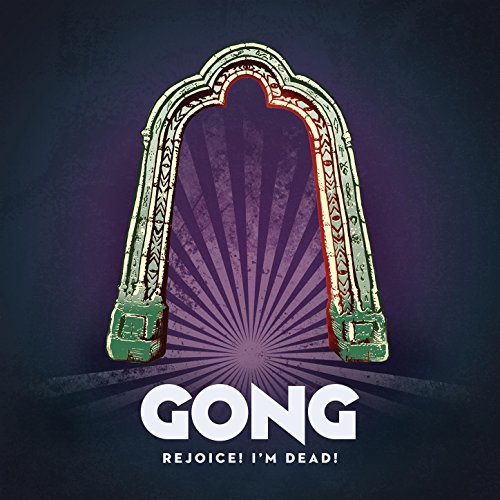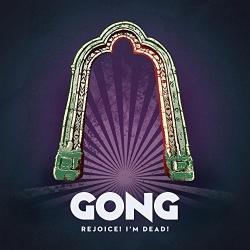Considering that he’s the mastermind behind the wonderfully imaginative and unconventional Knifeworld, it’s not too surprising that Iranian/English singer and composer Kavus Torabi joined Gong a couple years ago. After all, the iconic psychedelic/jazz/space rock troupe—which was founded in 1967 by Daevid Allen and Gilli Smyth—no doubt influenced Knifeworld’s penchant for genre-mashing eccentricity and peppered humor. While 2014’s effort I See You signaled Torabi’s first outing with the group (as well as the last for both Allen and Smyth, who passed away in 2015 and 2016, respectively), it’s this year’s Rejoice! I’m Dead that cements him as the new face and voice of Gong—and man, what a sublime showcase it is. Fitting very well within beloved the Gong aesthetic, the full-length also sounds a lot like a counterpart to Knifeworld’s latest gem, Bottled Out of Eden. Like that record, this one is a lovely gamble into warm textures, jovial adventurousness, engaging melodies, and lavish embellishments. Best of all—and as its title suggests with dark wit—it feels like a celebration of Allen’s legacy (rather than a morose lamentation on it), which is exactly what he would’ve wanted.
When we spoke in April for Popmatters, he admitted that he was initially reluctant to take over in Gong after Allen’s passing, adding:
My opinion was that I was already the frontman of Knifeworld and that doing it without Daevid just seemed wrong. Even the Gong fan in me thought, We’ll, why would we do that? I was very much against it until we did the tour in support of the last album, I See You. Daevid was still alive, but he couldn’t talk because he was so ill. We had a few dates that we had to honor, and when we started touring the material, it just felt so magical. . . . When we finished touring Gong as a five piece, I really thought that we should actually go forward, and the rest of the band agreed.
As for the writing process, he states: “The songs became very elastic[;] what may have been brought to the band as a fixed idea, through experimenting, discarding, expanding[,] and mutating[,] evolved into the songs as you hear them now. Every member was key in the development of each song.” Without a doubt, Rejoice! I’m Dead explodes with a sense of communal dedication and focus, as well as determination to bring cheerful artistry to angst-ridden circumstances.
“The Thing That Should Be” bursts out of the speakers with a characteristic blend of guitar chords, horns, and crashing percussion, introducing Torabi and company as they affirm, “The time has come again / Rejoice, you're dead / And walk on through the open door / It's nowhere that you haven't been, my friend / A million times or maybe more” with full-bodied enthusiasm. As usual, his rich tone blends perfectly with the similarly robust instrumentation, which is fairly straightforward for the entire song (although the last minute or so moves into a spacier deviation).
Afterward, “Rejoice!” launches with playful counterpoints between all the instruments before settling into an accessible yet still vibrant rock formation whose backing elements constantly change to keep things unpredictable and bouncy. There are also some pretty tricky transitions here and there, plus Torabi’s trademark interlocking guitar patterns and a visceral and intense psychedelic excursion halfway through that definitely harkens back to ‘70s stoner rock. Coupled with the always vivacious orchestration and a guitar solo from Gong legend Steve HIllage, it’s quite a gripping and lively listen, as is “Kapital,” which showcases Torabi’s fondness for ominous vibes (as seen in Knifeworld greats like “The Skulls We Buried Have Regrown their Eyes”). It’s a short but effectively trippy entry, for sure.
In contrast, “Model Village” is bittersweet and dreamy, evoking the psychedelic echoes of The Lennon Claypool Delirium’s Monolith of Phobos, recent Phideaux, and early Porcupine Tree; in particular, its emotional arpeggios, shuffling rhythms, and forlorn vocals culminate in a superbly surreal yet touching and vintage ode that ranks as one of the most distinctive and rewarding tracks here. Next, “Beatrix” is a sparse jazz instrumental comprised mostly of piano chords, saxophone, and prerecorded spoken words from Allen. It definitely recalls some of Frank Zappa’s comparable ventures, and it, matched with the leisurely “Visions” (which channels the atmospheric melancholia of King Crimson’s Islands and Genesis’ Wind & Wuthering) provides a strong prelude to another LP highlight, “The Unspeakable Stands Revealed.” At the risk of suggesting too many comparisons, its initial blend of pulsating bass lines, mellow percussion, triumphant horn massages, and defiant guitar strums surely evokes the smooth comfort of early Camel. Once Torabi’s aforementioned patterns appear alongside his backing chants, it becomes even more engrossing and tranquil. Roughly halfway through, the proper song starts, yet it doesn’t take long for Gong to venture even further out into their auditory cosmos, with exceptional results, as even more psychedelic madness ensues.
The penultimate “Through the Restless Seas I Come” is gentle at first, with soft horns, singing, and acoustic guitar strums melding into a serene but sorrowful soundscape; in terms of melodic and lyrical power, it’s likely the strongest piece on Rejoice! I’m Dead, as Torabi issues many tragic statements—such as “Where then yesterday? / Now all I was is passed / All heroic voyages and this will be my last / Through restless seas I come / Time just washed away to nothing more, to none / Words we used to say, all gone / All gone away, all done”—with frail conviction. The arrangement builds dramatically around each subsequent verse, creating a lot of tension and emotion to showcase how powerful this new iteration of Gong can be. It’s truly a beautiful and complex gem.
As for closer “Insert Yr Own Prophecy,” it’s more energetic, quick, and victorious overall, with persistent spurts of frenzy complementing outbursts of understanding and closure. Despite not being the lengthiest selection in the sequence, it’s probably the most dynamic, as it shifts constantly and seamlessly between intricate flourishes to peaceful reflections. Like much of Rejoice! I’m Dead, there’s a lot of heartfelt poeticism and prophetic viewpoints surrounding the colorful insanity, proving not only that Gong is as enjoyable and relevant as ever, but also that Torabi is the perfect person to take over for Allen and man the ship.


